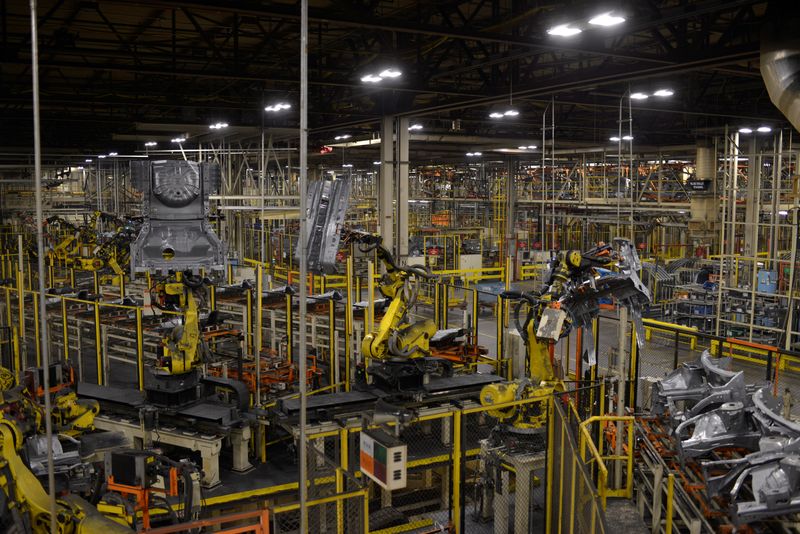By John Kemp
LONDON (Reuters) -U.S. manufacturers probably entered a recession in the fourth quarter of 2022, based on a range of high-frequency indicators, part of a global downturn in industrial output that is creating some slack in commodity markets.
The Institute for Supply Management’s (ISM) manufacturing purchasing managers’ index fell below the 50-point threshold dividing expanding activity from a contraction in both November and December.
The Federal Reserve’s manufacturing production index declined in both November and December and showed output down 0.4% at the end of 2022 compared with 2021.
U.S. manufacturers continued to increase their selling prices in the fourth quarter, but the rate of producer price inflation has decelerated as input cost pressures have eased and demand for goods has fallen.
Producer price inflation for goods other than food and energy slowed to an annualised 4.2% in the three months ending in December 2022 from 11.5% in the three months ending in April 2022.
U.S. manufacturers also continued to increase employment, but jobs are a lagging indicator, and the rate of growth has decelerated as the sector responds to falling demand for merchandise.
Manufacturing payrolls increased at an annualised rate of 1.6% in the three months ending in December, down from annualised growth of 5.5% in the three months ending in April.
Container freight handled through the nine biggest ports slowed to 2.49 million twenty-foot equivalent units (TEUs) in November from 2.81 million in the same month a year earlier and the lowest for the time of year since 2015.
Container freight hauled on the major U.S. railroads slowed to 1.07 million TEUs in November from 1.13 million in the same month a year earlier and the lowest for the time of year since 2012.
The most recent weekly data from the Association of American Railroads shows containerised freight volumes were down 9% in the first two weeks of 2023 compared with the same period in 2022.
Chartbook: U.S. manufacturing and freight activity
Slackening demand for merchandise and freight is starting to show up in increased discounting to stimulate sales and clear excess inventories.
U.S. consumer prices for merchandise other than food and energy fell at an annualised rate of 4.8% in the three months to December.
Electric vehicle manufacturer Tesla (NASDAQ:TSLA) this month announced price cuts by between 6% and 20% in the United States for its top-selling models (“Tesla turns up heat on rivals with global price cuts”, Reuters, Jan. 13).
In response to falling demand, Federal Express plans to scale back Sunday parcel deliveries for many parts of the country from March (“FedEx to further trim Sunday deliveries”, Reuters, Jan. 10).
The overall picture is one where manufacturing and freight volumes are falling in response to significant price increases, declining real incomes and rising interest rates.
The weakness of manufacturing in the United States and even more so in Europe and China explains the slump in a broad range of commodity prices towards the end of 2022.
The downturn is likely to deepen over the next few months as real incomes continue to erode and interest rates increase further.
The new orders component of the ISM manufacturing survey has been below the 50-point threshold in six of the seven most recent months.
The index slipped to just 45.2 in December, in only the eight percentile for all months since 1980, and its lowest level since the first wave of the pandemic in 2020 and before that 2012.
More than twice as many manufacturers reported new orders fell (32%) rather than increased (16%) in December compared with November, according to the ISM, implying even lower activity levels ahead.
Related columns:
- U.S. manufacturing downturn will cut diesel consumption (Reuters, January 5)
- U.S. diesel use slows as manufacturing, freight falter (Reuters, December 1)
- U.S. container freight is shrinking (Reuters, November 16)
- Recession by any other name will still reset the economy (Reuters, November 2)
John Kemp is a Reuters market analyst. The views expressed are his own
